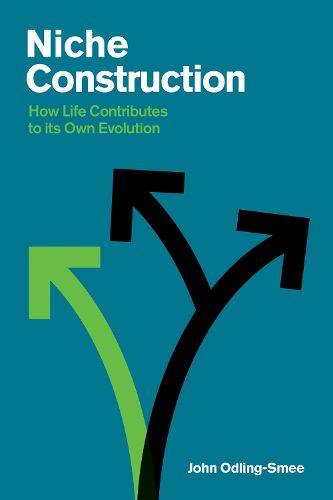Readings Newsletter
Become a Readings Member to make your shopping experience even easier.
Sign in or sign up for free!
You’re not far away from qualifying for FREE standard shipping within Australia
You’ve qualified for FREE standard shipping within Australia
The cart is loading…






How niche construction theory extends evolutionary theory beyond natural selection to a more general theory about the coevolution of organisms with their environments.
How niche construction theory extends evolutionary theory beyond natural selection to a more general theory about the coevolution of organisms with their environments.
In Niche Construction, John Odling-Smee, the leading authority on niche construction theory, extends evolutionary theory from an explanation of how populations of organisms respond to natural selection pressures in their environments to a more general theory about the coevolution of organisms with their environments. Organisms, he shows, cause changes in their local external environments by interacting with them, thereby contributing in fundamental ways to their own and one another's evolution. This book applies niche construction theory to current problems such as human-induced global warming and suggests how humans might contribute positively to the future evolution of life on Earth.
Odling-Smee explains how orthodox evolutionary theory falls short in two ways. First, it does not describe how organisms contribute to their own and one another's evolution through their environment-changing niche constructing activities. Second, it fails to explain how genetic evolution can give rise to supplementary knowledge-gaining processes in many species. These include certain developmental processes in individual organisms and socio-cultural processes in animals, including humans. Neo-Darwinism, the author writes, assesses the fitness of individual organisms in populations in terms of their capacity to survive and reproduce, but without attributing these capacities to the active, purposeful agency of organisms. He argues that the purposeful agency of individual organisms plays a central role in evolution. He also discusses the relationship of an organism's energy-consuming activities and the second law of thermodynamics.
$9.00 standard shipping within Australia
FREE standard shipping within Australia for orders over $100.00
Express & International shipping calculated at checkout
How niche construction theory extends evolutionary theory beyond natural selection to a more general theory about the coevolution of organisms with their environments.
How niche construction theory extends evolutionary theory beyond natural selection to a more general theory about the coevolution of organisms with their environments.
In Niche Construction, John Odling-Smee, the leading authority on niche construction theory, extends evolutionary theory from an explanation of how populations of organisms respond to natural selection pressures in their environments to a more general theory about the coevolution of organisms with their environments. Organisms, he shows, cause changes in their local external environments by interacting with them, thereby contributing in fundamental ways to their own and one another's evolution. This book applies niche construction theory to current problems such as human-induced global warming and suggests how humans might contribute positively to the future evolution of life on Earth.
Odling-Smee explains how orthodox evolutionary theory falls short in two ways. First, it does not describe how organisms contribute to their own and one another's evolution through their environment-changing niche constructing activities. Second, it fails to explain how genetic evolution can give rise to supplementary knowledge-gaining processes in many species. These include certain developmental processes in individual organisms and socio-cultural processes in animals, including humans. Neo-Darwinism, the author writes, assesses the fitness of individual organisms in populations in terms of their capacity to survive and reproduce, but without attributing these capacities to the active, purposeful agency of organisms. He argues that the purposeful agency of individual organisms plays a central role in evolution. He also discusses the relationship of an organism's energy-consuming activities and the second law of thermodynamics.